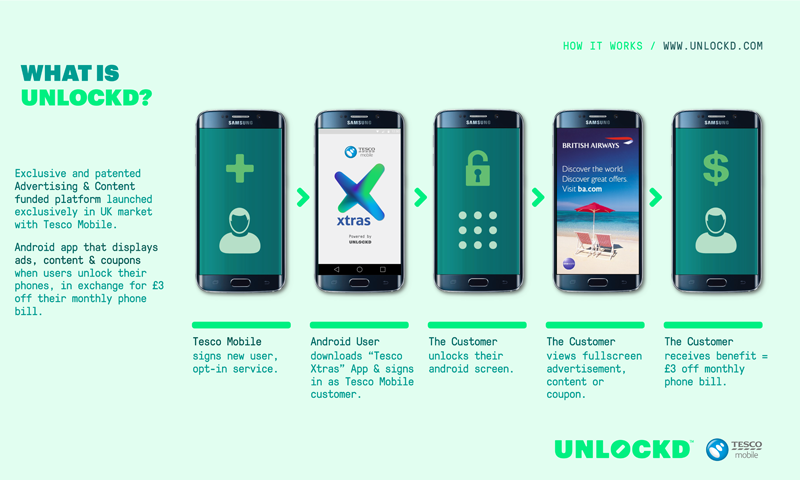The Top 10 telecom startups launched in 2016
Free roaming, chatbots, and smart city the DIY way.
1. Unlockd: Lower your mobile phone bill
Funding: $16 million
Countries: Australia, UK, US

We have already heard about FreedomPop, an American startup running a freemium MVNO. The idea of a free mobile service has proved attractive enough to lure other players.
One of them is Unlockd, an Australian startup that decided to take the concept to its logical extreme by offering any operator who might want to enroll an option that allows subscribers to cut their phone bills. It works like this. Every time users swipe the screen to unlock their handset they get full-screen ad content tailored to their location and interests. If they watch at least one ad a day, subscribers receive credit in their account or get bonuses at the end of the month. If they do not like it, they can disable the feature.
The founders of the project have already signed contracts with several major communications service providers. In the UK, Tesco, the country’s largest retailer, is using Unlockd in its MVNO project (MVNO Tesco Mobile).
Operators may offer various benefits to their subscribers after they view ads. For instance, Boost Mobile’s subscribers get $5 off their monthly bills for engaging with ads. Lebara Mobile shows users targeted ads or special offers in exchange for a bonus monthly 2GB of data.
2. Estimote: Smart city the DIY way
Funding: $13.8 million
Countries: Poland, US

Imagine that the world around us is full of beacons transmitting information about objects to smartphones. For example, if you cannot remember where you left your car, you can easily find where you parked it following the navigation instructions sent to you by a beacon. Or, you can create an app that will wake you up at the right time. Here is another example. If traffic is busier than usual and you risk missing an important appointment, a smart beacon notifies your smartphone by sending a signal to it and your alarm clock goes off earlier than scheduled in order to allow you to be on time. With iBeacons technology, you can easily build an IoT ecosystem almost anywhere.
Beacons are brightly-colored enclosures that can be attached to any surface and transmit data about the object they are on to a smartphone via Bluetooth Low Energy. Some of them come with a built-in NFC tag. They have an ARM processor, memory card, a battery that lasts up to 2 years, accelerometer and temperature sensor. These are enough to create dozens of use scenarios, ranging from smart city and smart home applications to smart warehouse and store implementations.
In contrast to ideas promoted by classic IoT startups, Estimote’s approach seems particularly interesting as it offers almost an unlimited breadth of application possibilities. Rather than embedding sensors into existing objects, it is much easier, cheaper and faster to attach them. In 2016, Estimote raised $10.7 million in funding.
Today, Estimote beacons are already used by a number of IoT service providers; it is very likely that telecom operators will also be interested in using configurable sensors in their IoT projects.
3. GoTenna: No coverage? Not a problem!
Funding: $9.3 million
Country: US

Most people would agree there is nothing more frustrating than seeing “Message not sent” on your smartphone display when you need to get in touch with someone in a crowd or in rural or wilderness locations. A Brooklyn-based team of young developers came up with the idea of a gadget that would be able to send messages even in locations with a weak signal or no network connectivity at all.
goTenna was founded in 2012, after the lives of millions of Americans had been affected by a natural disaster. Hurricane Sandy knocked out a quarter of all the cell towers in ten states in just several hours. It cut power to more than 8 million homes. Hundreds of people could not reach their loved ones or emergency services. The idea of a portable transmitter that could be carried in a pocket and be able to send a SOS signal at any time proved to be extremely relevant.
goTenna is a pocket-size device. It can be easily paired with any smartphone wirelessly via Bluetooth and an app. Each gadget has a built-in 2-watt VHF transceiver, which is enough to send or receive a message at a distance of 2-5 kilometers. Text messages are sent using radio frequencies; the only condition is that the recipient must have a similar device. goTenna’s app also enables private one-to-one and group chats. Each device has a USB-rechargeable battery that can last up to 24 hours. In other words, goTenna allows you to turn any smartphone into a walkie-talkie and communicate with other people nearby, for example, while camping.
4 years after the launch, goTenna is a successful technology company that has raised almost $10 million in funding. In 2016, the project was ranked among the top 50 startups in New York and became the Gold winner of the International Design Excellence Awards. In 2015, goTenna got awards in the Tech for a Better World and Wireless Handset Accessories categories at CES Innovation Awards, an international competition honoring outstanding consumer technology products.
4. Api.Ai: A chatbot in two clicks
Funding: $8.6 million
Countries: Russia, US

In 2016, virtual assistants (chatbots) became one of the most prominent trends offering probably the greatest potential in terms of practical use. They help you order a taxi, tell you about the weather and exchange rates, assist you in submitting orders at online stores or just talk to you. AI-powered voice interfaces are more intelligent than Apple’s much-hyped Siri. Experts predict that chatbots will replace messengers and other popular applications in the future.
In 2016, a Silicon valley-based team of Russian developers launched a chatbot development platform called Api.Ai. They promise it will take you just a few minutes to create a conversational scenario and then build additional dialogues. The quality of interactions with users is improving constantly thanks to machine learning technology. The service has an SDK to enable integration with multiple third-party modules.
Unlike most chatbot evangelists, the Api.Ai developers do not limit themselves to social media. For example, they are planning to pair chatbots with smart glasses to enable users to activate navigation software and find routes with their voice. By pairing chatbots with smart homes, they want to let users manage devices with voice commands. Finally, integration with smart TV will allow users to choose any content they want just by talking to a bot.
The platform is available to everyone; telecom operators may benefit from it by using chatbots to promote their services.
5. AVO and СomfortWay: Cheap roaming
Funding: ComfortWay – $7.7 million, Avo – $67 thousand
Country: Russia

When Aleksandr Chebotar, a young tech entrepreneur, got a $900 roaming bill from his mobile operator, he realized it was time for a change. He developed AVO, a mobile application that helps users save money while traveling abroad. It works like this. When you come to another country, you buy a local SIM with the rate plan that suits you best (e.g. a rate plan that offers cheap data). Your home number, which you should register in AVO, remains active. You can still use it to receive calls via the mobile application.
Incoming calls are free of charge; outgoing calls are charged at a minimum rate. For the first time, users can call home using their home number (via the application) and get cheap data services from local operators at the same time. And you don’t have to carry two phones.
In 2016, the AVO developers teamed up with ComfortWay, another Russian innovation-focused project. In August, travelers got an opportunity to buy a SIM card not tied to any network and choose any local network operator in 140 countries, including Russia. The two startups are planning to launch a joint platform, putting operators’ roaming revenues at risk in those countries where the solution is available.
However, rather than being frightened, network operators should welcome the new application, as it allows subscribers, most of whom have long ago switched to free messengers and Skype as the main tool of communication abroad, to continue using their number in the operator’s network as the main identifier and make calls to ordinary mobile phone numbers.
6. Starry Internet: Super-fast wireless internet
Funding: $63 million
Country: US

Starry was founded by Chet Kanojia, the former CEO of Aereo, an over-the-air television startup that was going to disrupt the cable companies’ business model. The Aereo service was shut down two years after its launch amid legal challenges. In his next project Starry, Kanojia began with the development of a new home router. This time, he wants to revolutionize the broadband wireless access tech6nology.
In a nutshell, Starry Internet, Chet’s new idea, is yet another reincarnation of the millimeter wave technology promising to deliver gigabit internet over the air. The startup is trying to tap into the millimeter wave segment of the market that still remains unchartered territory for mobile network operators. The creator of Starry Internet wants to work as a network operator but use a technology that does not require too much licensing. It is exactly the same approach he took in his former project Aereo when he wanted to let users receive over-the-air broadcast network channels via the internet without having to be cable or satellite subscribers and charge them for rented antennas rather than the channels they watched.
Despite treading on thin ice, Chet managed to sell what remained of his former project for $1 million to TiVo, a major TV market player, which was interested in Aereo’s client base. Now, Chet decided to use the radio frequencies that are planned for 5G deployment in the US. He still has a chance to start signing up subscribers to a gigabit wireless home internet service before telecom operators launch similar services.
This time, Starry’s founder is treading more cautiously, which makes it likely that his new project will beat Aereo in revenue. And the spectrum range itself, which is really new for the industry, may become a fertile ground for big breakthroughs, given that most network operators and technology companies worldwide are just evaluating their chances with ultra-speed mobile internet and are picking optimal frequencies for their 5G deployments.
7. WeFarm: Farmers of the world, connect!
Funding: $4.7 million
Country: UK

If we have a question, we can always ask Google. But what should people who live on less than a dollar a day do? WeFarm, a UK-based company, entered the market with an offering that has already been named one of the best world-changing startups.
WeFarm is a free peer-to-peer service that enables farmers around the world to share information via SMS. In a way, it is a social network for developing countries where smartphones with access to mobile broadband remain a luxury available to few people. WeFarm founders believe that free access to information is one of the fundamental human rights and that sharing knowledge is what makes people really happy. “We're working with people who have previously never been asked for their opinion,” says Kenny Ewan, CEO of WeFarm. “We are asking them to share their experience with others and that is a very powerful thing.”
The idea behind the project is pretty simple. A farmer sends an SMS message with a question they have about farming (“how to start a rabbit farm”, “how to protect your tomato crop from pests”, etc.) to WeFarm, and WeFarm resends the SMS to all the farmers subscribed to the service. The system can automatically translate messages from one language to another; so, a question in English from Africa can be shown to farmers in Peru in Spanish. Subscribers’ answers are also sent back via WeFarm, and the farmer who asked the question can get the information he or she needs.
Currently, the service is growing most rapidly in Kenya. This country has become a sort of a testing ground for new cellular services which later spread across developing countries (like M-Pesa, a Safaricom’s project we have already told about in one of our posts). Across Kenya, Uganda and Peru, over 100,000 farmers have joined the service. In 2015 and 2016, WeFarm was named one of the UK’s top 100 startups.
8. TsunamiBlu: A Wi-Fi sharing platform for neighbors
Funding: N/A
Country: US

Tsunami Blu, a US-based startup, lets you earn money by sharing your broadband internet via Wi-Fi. Once you sign up as a host, the company mails you a pre-configured router with which you can enable your neighbors to connect to your Wi-Fi network through a simple pre-authorization procedure. The router tracks traffic usage for each connection and lets you limit the bandwidth as soon as a predefined threshold is reached.
With Tsunami Blu’s router, everyone can become a micro-provider at a university campus, in a squat, a coworking community or even in an apartment block. In the US where home internet rates are usually in the range from $35 to 65, such a service seems very promising. A router host can not only split the monthly internet bill with the neighbors but also earn some money.
The best part of the idea is the router that enables efficient connection management, ensures security and prevents unauthorized users from getting access to the community Wi-Fi. It deserves to be explored by telecom operators who may offer such a digital service to subscribers who choose big-volume data plans.
9. Mishiko: My pet deserves it
Funding: $2 million
Country: Russia

According to reports by the American Society for the Prevention of Cruelty to Animals, 14% of dogs are lost every year. And almost none of them find their way back home. Mishiko, a Russia-based IoT device developer, wants to reverse the trend. In September 2016, it announced the launch of a GPS collar that tracks your pet’s location with an accuracy of up to 4 meters.
Following the growing interest in wearables, such as fitness trackers, smart watches and Google Glass, companies started to offer smart pet gadgets. Mishiko leveraged the experience of the first wave of wearable dog devices to put together the latest GSM/UMTS and GPS/GLONASS technology, a powerful battery and an embedded SIM.
The collar bears an internet-enabled tracker that synchronizes with a mobile app. The global SIM chip can track the dog all over the world, including Russia, CIS countries, Europe and the US. Data is sent over cellular networks via an embedded SIM chip provided by T-Mobile. In Russia, the smart collar is priced at 9 thousand rubles. The mobile internet subscription costs 350 rubles per month; the price remains the same even while roaming.
The device not only helps track your pet’s location but also works as a fitness tracker. With it, owners can monitor their pets’ condition in the same way as they monitor their own health in the gym with wearables.
10. TrueBill: Where does the money go?
Funding: $1.9 million
Country: US

Every year we have to deal with more and more paid subscription services. Nothing makes their owners happier than charging us yet another dollar. Today, the range of such services includes not only conventional ones like electricity or mobile subscriptions but also subscriptions to cloud, video streaming and other digital services.
TrueBill offers you to track your subscriptions and payments via a single unified platform. It helps you understand which services you actually need and how much you spend on them monthly. Putting together subscriptions to music and video streaming services, news websites, games, electronic dictionaries and libraries, the developers of TrueBill let subscribers easily and effectively navigate the chaos of subscriptions and save up to 512 dollars annually. The service uses complex algorithms and the most secure protocols, without asking you to provide your credit card details.
As telecom operators go through the digital transformation process, they might employ TrueBill’s ideas to help their subscribers handle the flood of subscriptions or even encourage them to pay for some of the services using their mobile accounts in the future.
Stay connected!